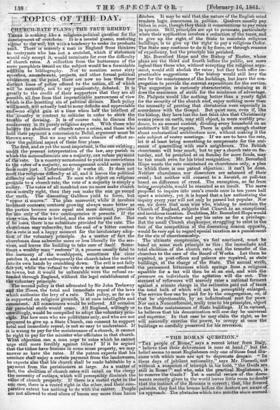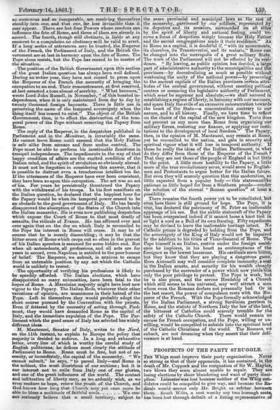"THE ROMAN QUESTION."
"THE people of Rome," says a recent letter from Italy, "believe that their deliverance is near at hand ;" but the belief seems to most Englishmen only one of those fond illu- sions with which men are apt to deprecate despair. "In these days of jubilant nationality," says Mr. Disraeli, not without a suspicion of triumph in his tone, "the Gauls are still in Rome!" and who, asks the practical Englishman, is to remove the Gauls ? Yet a careful review of the docu- ments recently given to the world leaves little room to doubt that the instinct of the Romans is correct ; that, like fevered patients, they feel the breeze before the doctors are aware of its approach. The obstacles which two months since seemed so numerous and so insuperable, are resolving themselves steadily into one, and that one, far less invincible than it may appear. There are but four Powers whose resolves can influence the fate of Rome, and three of them are already in accord. The fourth, though still obstinate, is liable at any moment to a compulsion no obstinacy‘vill be valid to avert. If a long series of utterances may be trusted, the Emperor of the French, the Parliament of Italy, and the British Go- vernment are at last in harmony upon the fate of Rome. The Pope alone resists, but the Pope has ceased to be master of the situation.
The position of the British Government upon this section of the great Italian question has always been well defined. During an entire year, they have not ceased to press upon the emperor of the French the necessity of bringing the occupation to an end. Their remonstrances, at first reserved, at last assumed a tone almost of acerbity. "What becomes," wrote Lord John Russell, in November, "of this boasted in- dependence, when it is only maintained from day to day by twenty thousand foreign bayonets. There is little use in preserving the name of the temporal sovereignty when the thing itself has-ceased to exist.' The object of the British ,Government, then, is to effect the destruction of the tem- poral power of the Pope without removing the Papacy from Rome.
The reply of the Emperor, in the despatches published in Parliament and in the Moniteur, is invariably the same. He cannot leave Rome until assured that the Holy Father is safe alike from menace and from undue control. The Pope must be able to perform his inestimable functions in tranquil independence. The impediments in the way of that happy condition of affairs are the excited condition of the Italian mind, and the spirit of revolution so obviously abroad. It must not be forgotten in considering this answer, that it is possible to distrust even a treacherous intellect too far. If the utterances of the Emperor have ever been consistent, they have been so upon this occupation. The act was no act of his. For years he persistently threatened the Papacy with the withdrawal of his troops. In his first manifesto on the Italian question, he declared that the happiest hour for the Papacy would be when its temporal power ceased to be an obstacle to the good government of Italy. He has barely -disapproved the absorption of the States of the Church into the Italian monarchy. He is even now publishing despatches which expose the Court of Rome to that most deadly of assaults, the ridicule of France. He has affirmed over and over again that on the day on which Italy is reconciled to the Pope his interest in Rome will cease. It may be of course that he is merely dissembling ; it may be that the bitter scorn of Rome which crops out so often in the gravest -of his Italian speeches is assumed for some hidden end. But when all antecedents, all professions, and all acts are for years in accord, even Napoleon is entitled to the poor honour of belief. The Emperor, we submit, is anxious to escape from an untenable position by any act which the Catholic world is unlikely to resent. The opportunity of verifying his professions is likely to be speedily afforded. The Italian elections, which have disappointed so many animosities, have been fatal to the hopes of Rome. A Mazzinian majority might have lent new vigour to the Papacy. The Italian Reds, whatever their other variations of opinion, are unanimous in their hatred of the Pope. Left to themselves they would probably adopt the short course pursued by the Convention with the priests. Even if fettered by the necessity of acting through Pied- mont, they would have demanded Rome as the capital of Italy, and the immediate expulsion of the Pope. The Par- liament which the good sense of Italy has selected has widely different ideas.
M. Mauteucci, Senator of Italy, writes to the Nord, -on the 11th instant, to explain to Europe the policy that majority is decided to enforce. In a long and exhaustive letter, every line of which is worthy the careful study of English politicians, he defines most clearly the attitude of Parliament to Rome. Rome must be free, but not of ne- cessity, or immediately, the capital of the monarchy. "Vie cannot submit," he says, "to parcel Italy—and Rome is the noblest, the most illustrious of our sections ; but it is our interest not to exile from Italy one of our glories, and one of the great influences of the world. The contact and infiltration of liberty may, as we ardently wish, as we even venture to hope, renew the youth of the Church, and God knows how long that Church may yet once more be able to bless a multitude of faithful souls We can- not seriously believe that a small territory, subject to the same provincial and municipal laws as—trie—rest the monarchy, garrisoned by our soldiers, represented /iy- its deputies and its senators, surrounded on all sides by the spirit of liberty and national feeling, could be.. come a focus of despotism simply because the Holy Father and the sacred congregations made it their residence." As to Rome as a capital, it is doubtful if, "with its monuments, its churches, its Transteverini, and its malaria," Rome can be changed into the metropolis of a great military State. The work of the Parliament will not be affected by its resi- dence. "By leaving, as public opinion has decided, a large part of administrative authority to the municipalities and the provinces—by decentralizing as much as possible without. weakening the unity of the national power—by preserving to the ancient capitals of the Italian provinces certain attri- butes of the central government, without creating political centres or menacing the legislative authority of Parliament, which must be supreme and absolute,—we shall succeed in establishing a regime of liberty, in harmony with our manners, and spare Italy the evils of an excessive concentration towards the heart of the State—a concentration contrary to our nature, and to all history. Finally, we have time to reflect on the choice of the capital of the new kingdom. Turin does not prevent us any more than Rome from organizing our military forces, restoring our finance, or applying our insti- tutions to the development of local freedom." The Papacy, then, in the opinion of M. Manteucci, may remain at Rome, yet be reconciled to the nation, and gain in security and spiritual vigour what it will lose in temporal authority. If these be really the ideas of the Italian Parliament, in what do they differ from those of the Emperor of the French ? That they are not those of the people of England is but little to the point. A little more hostility to the Papacy, a little more of the true revolutionary verve, would seem to English- men and Protestants to argue better for the Italian future. But even they will scarcely question that this moderation, so little expected from a popular body—this statesmanlike patience so little hoped for from a Southern people—render the solution of the eternal "Roman question" at least a , possibility. There remains the fourth power yet to be conciliated, but even here there is still ground for hope. The Pope, it is true, has declared the patrimony of St. Peter an inalienable appanage of his see. But the subtle statecraft of the Papacy has been overpraised indeed if it cannot loose a knot tied in so light a cord as a Bull of its own framing. Fifty expedients may be devised to leave the inalienable heritage intact. No Catholic prince is degraded by holding from the Pope, and the sovereignty of the King of Italy would not be impaired by the addition to his titles of Vicar-General of Rome. The Pope himself is an Italian, restive under the foreign assist- ance he implores, in his heart as contemptuous of the foreigner as the lowest lazzarone. His cardinals seem bitter, but they know that they are playing a dangerous game. Even Antonelli may well consider complete immunity, a seat in the Italian senate, and security for his wealth cheaply purchased by the surrender of a power which now yields hini only the poor privilege to protest. The Pope is weak, but he is also pious, and the serene Headship of a Church which still seems to him universal, may well attract a man whom even the Romans declare not personally bad. Or in the last resort, the power of compulsion rests with the Em- peror of the French. With the Pope formally acknowledged by the Italian Parliament, a strong Sardinian garrison in. Rome, and the statute of Northern Italy the law of the land, the bitterest of Catholics could scarcely tremble for the safety of the Catholic Church. There would remain neo excuse for French occupation, and the Pope, willing or un- willing, would be compelled to subside into the spiritual head of the Catholic Christians of the world. The Romans, we submit, are not dreaming when they assert that their deli- verance is at hand.































 Previous page
Previous page